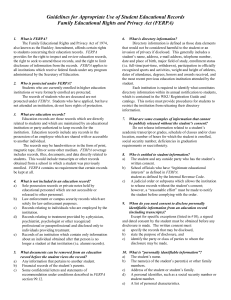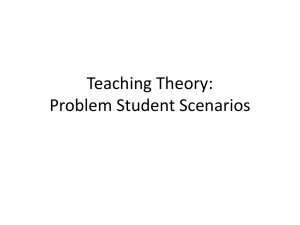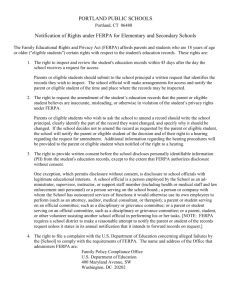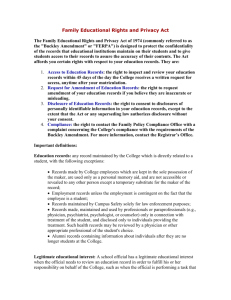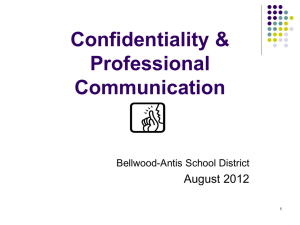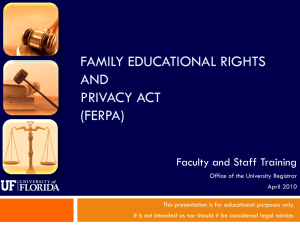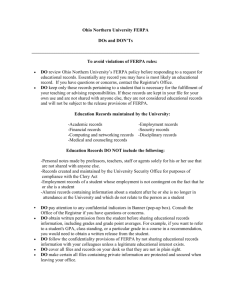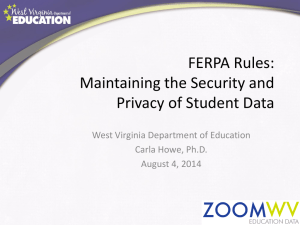Research Involving Student Education Records
advertisement
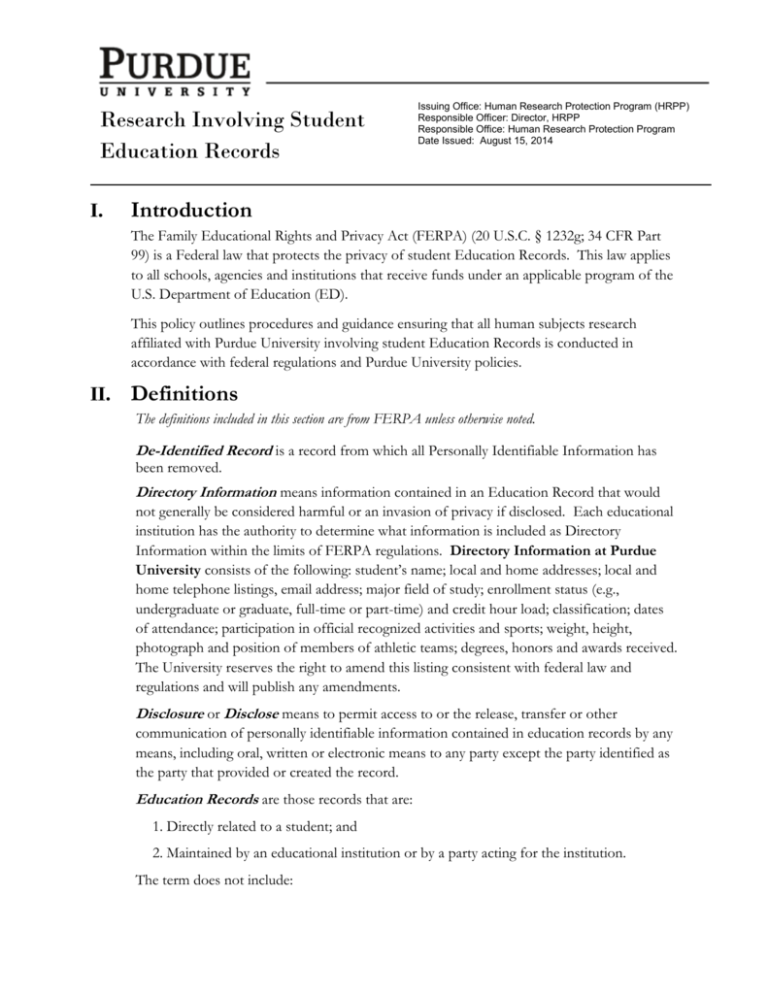
Research Involving Student Education Records I. Issuing Office: Human Research Protection Program (HRPP) Responsible Officer: Director, HRPP Responsible Office: Human Research Protection Program Date Issued: August 15, 2014 Introduction The Family Educational Rights and Privacy Act (FERPA) (20 U.S.C. § 1232g; 34 CFR Part 99) is a Federal law that protects the privacy of student Education Records. This law applies to all schools, agencies and institutions that receive funds under an applicable program of the U.S. Department of Education (ED). This policy outlines procedures and guidance ensuring that all human subjects research affiliated with Purdue University involving student Education Records is conducted in accordance with federal regulations and Purdue University policies. II. Definitions The definitions included in this section are from FERPA unless otherwise noted. De-Identified Record is a record from which all Personally Identifiable Information has been removed. Directory Information means information contained in an Education Record that would not generally be considered harmful or an invasion of privacy if disclosed. Each educational institution has the authority to determine what information is included as Directory Information within the limits of FERPA regulations. Directory Information at Purdue University consists of the following: student’s name; local and home addresses; local and home telephone listings, email address; major field of study; enrollment status (e.g., undergraduate or graduate, full-time or part-time) and credit hour load; classification; dates of attendance; participation in official recognized activities and sports; weight, height, photograph and position of members of athletic teams; degrees, honors and awards received. The University reserves the right to amend this listing consistent with federal law and regulations and will publish any amendments. Disclosure or Disclose means to permit access to or the release, transfer or other communication of personally identifiable information contained in education records by any means, including oral, written or electronic means to any party except the party identified as the party that provided or created the record. Education Records are those records that are: 1. Directly related to a student; and 2. Maintained by an educational institution or by a party acting for the institution. The term does not include: 1. Records that are kept in the sole possession of the maker, are used only as a personal memory aid, and are not accessible or revealed to any other person except a temporary substitute for the maker of the record. 2.Records of the law enforcement unit of an educational institution, subject to the provisions of § 99.8. 3.(i) Records relating to an individual who is employed by an educational institution, that: (A) Are made and maintained in the normal course of business; (B) Relate exclusively to the individual in that individual’s capacity as an employee; and (C) Are not available for use for any other purpose. (ii) Records relating to an individual in attendance at the institution who is employed as a result of his or her status as a student are education records and not excepted under paragraph (b)(3)(1) of this definition. 4. Records on a student who is 18 years of age or older, or is attending an institution of postsecondary education that are: (i) Made or maintained by a physician, psychiatrist, psychologist, or other recognized professional or para-professional acting in his or her professional capacity or assisting in a para-professional capacity; (ii) Made, maintained, or used only in connection with treatment of the student; and (iii) Disclosed only to individuals providing the treatment (not including remedial educational activities or activities that are part of the program of instruction at the institution; and 5. Records created or received by an educational agency or institution after an individual is no longer a student in attendance and that are not directly related to the individual’s attendance as a student. 6. Grades on peer-graded papers before they are collected and recorded by a teacher. Eligible Student is a student who has reached 18 years of age or is attending an institution of postsecondary education. Legitimate Educational Interest or “need to know” is the need to access an education record in order to perform a teaching or administrative task that is specified in a University Official's position description or contract agreement, perform a task related to a student's education or to discipline of a student, provide a service or benefit related to the student or student's family, or maintain the safety and security of campus. An example would be an academic advisor to a student reviewing the student's record on what courses have been 2 completed. This is related to the task of advising the student. The advisor would not be authorized to view records that are not relevant to the task at hand. Parent includes a natural parent of a student, a guardian or an individual acting as a parent in the absence of a natural parent or guardian. Personally Identifiable Information (PII) includes, but is not limited to, a student’s name; name of student’s parent or other family members; the address of a student or student’s family; a personal identifier, such as the student’s social security number, student identification number, including any portion thereof, or biometric record; other indirect identifiers, such as a student’s date of birth, place of birth and mother’s maiden name; other information that, alone or in combination, is linked or linkable to a specific student that would allow a reasonable person in the school community, who does not have personal knowledge of the relevant circumstances, to identify the student with reasonable certainty; or information requested by a person who the educational institution reasonably believes knows the identity of the student to whom the education record relates. Records Custodian The staff member responsible for Student records within the area where the record is located. At Purdue University, the records custodian is the Registrar at the campus which maintains the education record (i.e., West Lafayette, IPFW, Calumet and North Central). Only the Registrar, or his/her designee, may authorize the disclosure of student education records for research purposes. School Official is a member of an institution who acts in the student’s educational interest within the limitations of their “need to know.” FERPA does not define “school official” but states that institutions must establish their own criteria according to their own procedures and requirements. Purdue University’s definition of school official can be found defined under “University Official” under this Definitions section. Student is an individual who is presently enrolled and attending, or has been enrolled and attended the University or school, and for whom the University or school maintains records. University Official is any faculty or staff member, administrator, person under contract to, or serving as the agent of, the University who acts in the student’s educational interest within the limits of their “need to know” in order to perform a specific task and whose responsibilities reasonably require access to student records. III. Policy Purdue University’s Human Research Protection Program (HRPP) requires that all Purdueaffiliated investigators abide by the Family Educational Rights and Privacy Act (FERPA) and human subject protections requirements when conducting human subjects research involving education records. FERPA grants educational institutions with the authority to determine what information may be accessed from an Education Record. If an institution denies an investigator access to information in an Education Record, the IRB cannot overrule the decision. 3 IV. Procedures and Guidelines A. Obtaining Consent to Access Education Records for Research Purposes FERPA gives parents the right to consent to the disclosure of their children’s Education Records. These rights transfer to the student when he or she reaches the age of 18 or attends a school beyond the high school level. Such students are referred to as “Eligible Students.” FERPA regulations require that an Eligible Student or parent must provide a signed and dated written consent in accordance with the requirements of § 99.30 before Personally Identifiable Information from Education Records is disclosed, unless the disclosure falls within one of the exceptions set forth in § 99.31. FERPA’s consent provisions require the following elements be included: 1. Specification of the records that may be disclosed; 2. A statement of the purpose of the disclosure; and 3. Identification of the party or class of parties to whom the disclosure will be made.1 4. If a prospective student is not an Eligible Student under this policy, the student’s parent must provide signed consent for disclosure of Personally Identifiable Information from the student’s Education Records. B. Access to Records for Research Purposes Without Obtaining Consent 1. Disclosure of Directory Information FERPA allows schools to designate and disclose, without consent, certain items of information as “directory information”, such as a student’s name, address, telephone number, date and place of birth, honors and awards, and dates of attendance. Each educational institution designates what information is considered directory information. FERPA requires that students be given the opportunity to file a request to prevent disclosure of directory information, commonly known as “opting out” Investigators should contact each institution from which s/he proposes to access student records and follow that institution’s FERPA policy and procedures when accessing directory information. 2. Disclosure of Education Records Without Personally Identifiable Information Education records may be released without consent under FERPA provided a school official (other than the investigator) with appropriate access strips the records of all personally identifiable information including: 1 34 CFR § 99.30 4 a. Student’s name and other direct personal identifiers, such as the student’s social security number or student number. b. Indirect identifiers, such as the name of the student’s parent or other family members; the student’s or family’s address, and personal characteristics or other information that would make the student’s identity easily traceable; date and place of birth and mother’s maiden name. c. Biometric records, including one or more measurable biological or behavioral characteristics that can be used for automated recognition of an individual, including fingerprints, retina and iris patterns, voiceprints, DNA sequence, facial characteristics, and handwriting. d. Other information that, alone or in combination, is linked or linkable to a specific student that would allow a reasonable person in the school community, who does not have personal knowledge of the relevant circumstances, to identify the student with reasonable certainty. Purdue Investigators who wish to access de-identified Purdue student education records must submit a request for student data to Purdue’s Office of the Registrar. The request should identify the purpose of the data request, specify all requested data points and identify any related IRB study associated with the data request. Additionally, the Investigator must enter into a data agreement with Purdue’s Office of the Registrar for use of the data. 3. School Officials with Legitimate Educational Interest FERPA allows educational agencies or institutions to disclose personally identifiable information from an Education Record of a student without the student’s consent if the disclosure is to school officials or, in the case of Purdue University, University Officials (see Definitions, Section II) who have been determined to have Legitimate Educational Interest (see Definitions, Section II) by the records custodian of that agency or institution. Purdue Investigators who wish to request an exception to FERPA in order to access Purdue student education records must submit a request for student data to Purdue’s Office of the Registrar. The request should identify the purpose of the data request, specify all requested data points and identify any related IRB study associated with the data request. Additionally, the Investigator must enter into a data agreement with Purdue’s Office of the Registrar for use of those data. 4. Studies to Develop, Validate, or Administer Predictive Tests; Administer Student Aid Programs; or Improve Instruction FERPA allows educational agencies or institutions to disclose personally identifiable information from an education record of a student without consent if the disclosure is to 5 organizations conducting studies for, or on behalf of, educational agencies or institutions to: a. Develop, validate, or administer predictive tests. b. Administer student aid programs. c. Improve instruction [34 CFR § 99.31]. A school district or postsecondary institution that uses this exception is required to enter into a written agreement with the organization or investigator conducting the research that specifies: a. The determination of the exception. b. The purpose, scope, and duration of the study. c. The information to be disclosed. d. That information from education records may only be used to meet the purposes of the study stated in the written agreement and must contain the current requirements in 34 CFR 99.31(1)(6) on re-disclosure and destruction of information. e. That the study will be conducted in a manner that does not permit personal identification of parents and students by anyone other than representatives of the organization with legitimate interests. f. That the organization is required to destroy or return all personally identifiable information when no longer needed for the purposes of the study. g. The time period during which the organization must either destroy or return the information. Purdue Investigators wanting to request an exception to FERPA in order to access Purdue student education records must enter into a data agreement with Purdue’s Office of the Registrar. The agreement must address all criteria listed above and identify any related IRB study associated with the use of the data. C. Use of Purdue University Student Records - Directory Information Purdue has designated the following categories of Personally Identifiable Information as Directory Information which the University may release and publish without students’ prior consent: name local and home addresses local and home telephone listings email address 6 major field of study enrollment status (e.g., undergraduate or graduate, full-time or part-time) and credit hour load classification dates of attendance participation in officially recognized activities and sports weight, height, photograph and position of members of athletic teams degrees, honors and awards received Directory Information does not include a student’s: V. Social Security number student identification number race gender grades GPA country of citizenship religion Investigator Responsibilities Investigators are responsible for meeting FERPA regulations, human subject protection requirements and University policy when accessing education records. VI. IRB/HRPP Responsibilities The Purdue University IRBs assess FERPA requirements when reviewing research studies that involve access to student education records. When research studies propose to access education records without parental/student consent, the IRB: 1. considers whether the records access meets the criteria for a waiver of informed consent at 45 CFR 46.116, and if so, 2. notifies investigators of their responsibilities to obtain exception(s) to parental/student consent at each educational institution from which education records access is requested. VII. Regulations and References Federal Laws and Regulations 34 CFR 99 45 CFR 46 20 U.S.C. § 1232g 7 U.S. Department of Education (ED) US Department of Education’s FERPA Policy Guidance US Department of Education, Recent Changes Affecting FERPA & PPRA, April 2002 Purdue University Purdue University Policy – Access to Student Education Records (VIII.A.4) FERPA Basics for Staff Handout FERPA Information Brochure for Faculty and Staff 8
